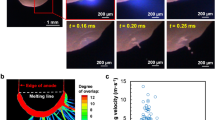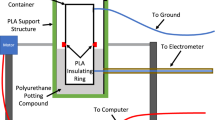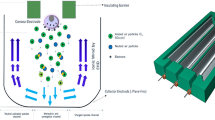Abstract
PREVIOUS work1,2 has shown that arcs on the negative electrode of a spark gap, were initiated around poorly conducting inclusions. As a logical development of this finding it became of some importance to differentiate between the respective parts played by inclusions and the metal, from which the cathodes were made, in the initiation of arcs.
This is a preview of subscription content, access via your institution
Access options
Subscribe to this journal
Receive 51 print issues and online access
$199.00 per year
only $3.90 per issue
Buy this article
- Purchase on Springer Link
- Instant access to full article PDF
Prices may be subject to local taxes which are calculated during checkout
Similar content being viewed by others
References
Pfeil, P. C. L., and Griffiths, L. B., Nature, 183, 1481 (1959).
Pfeil, P. C. L., and Griffiths, L. B., J. Nuclear Materials, 1, (3) (1959).
Author information
Authors and Affiliations
Rights and permissions
About this article
Cite this article
GRIFFITHS, L., PFEIL, P. Insulating Particles on Cathode Surfaces: their Effect upon Electrical Discharges. Nature 184, 1475–1476 (1959). https://doi.org/10.1038/1841475a0
Issue Date:
DOI: https://doi.org/10.1038/1841475a0
This article is cited by
-
Alpha Track Autoradiography of Sub-micron Aerosol Particles with the Electron Microscope
Nature (1968)
-
The psychedelic properties of banana peel: an appraisal
Economic Botany (1968)
Comments
By submitting a comment you agree to abide by our Terms and Community Guidelines. If you find something abusive or that does not comply with our terms or guidelines please flag it as inappropriate.



